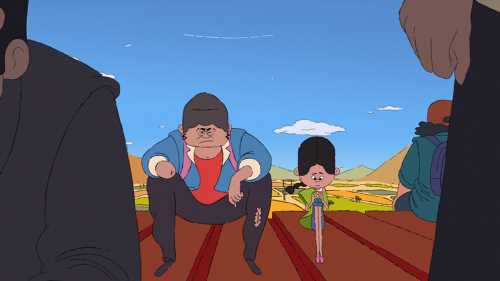Selected highlights from Annecy’s tribute to Mexico panorama, split into nine programs:
“La Bestia,” (Ram Tamez, 2020)
A best student film Annie Award winner and the first Spanish-language film from great Paris animation school Gobelins, co-directed and co-written by Tamez, a Guillermo del Toro Gobelins scholar. A heartrending gem, set on the roof of La Bestia, a freight train hurtling through Mexico used by emigrants to hitch a fast ride to the U.S., the wrench of emigration caught by a song co-wrote by Tamez.
“Cerulia,” (Sofia Carrillo, 2017)
Carrillo’s crowning stop-motion triumph to date, the tale of a little girl in her grandparents’ house who revisits it years later when they are deceased and the house up for sale. Sluiced by nostalgia and surreal touches, a near tactile paean to Carrillo’s own childhood and a world of pets and animals supposedly dead and gone which lives on in the director and now in the film. A Guadalajara and Morelia best animated short winner.

“Dalia Sigue Aquí,” (Nuria Menchaca, 2019)
Set against flashing screenshots of newspapers articles, the heartrending tale of Dalia, a little girl killed by soldiers, and whose spirit, accompanied by her pet chicken, watches her father dedicate the rest of his life looking for her body. Written by Menchaca and Carlos Isaac and dedicated to the 37,000 Mexican families still looking for their desaparecidos.
“Disney Shorts: Feliz cumpleaños!” (Alonso Ramírez Ramos, 2015)
A curio watched by millions online, in which a bunch of bandido piñatas threaten to ruin a Mexican Mickey Mouse’s birthday fiesta, with Minnie cooking a cake and Donald Duck and Goofy serenading proceedings. But a valiant Mickey turns the tables on the piñatas. None too funny, but animated with winning brio by Ramírez Ramos.

“Dr. Gecko’s Show,” (“El Show del Dr. Gecko ‘Sex Gender,” Marcos Almada Rivero, 2022)
This colorful TV special, produced by Micufilm and Carlos Azcuaga – and presented at Annecy – shows Dr. Gecko, stuck in his ways and suddenly forced to talk to a much younger reptilian generation. While he is quick to perpetuate gender stereotypes at first, he learns his lesson. So do the kids, encouraged to find their own path and identity. After all, girls want to be scientists too.
“Down to the Bones,” (“Hasta los huesos,” René Castillo, 2001)
In this stop-motion delight, filled with music and awarded also at Annecy – and directed by stop-motion pioneer René Castillo, who recently worked on Guillermo del Toro’s “Pinocchio” – death is just the beginning. Also, despite some initial scares, it’s actually not such a bad thing after all, as they sure know how to party in the afterlife. Produced by Calavera Films.
“Elena and the Shadows,” (“Elena y las sombras,” César Cepeda 2016)
Elena is feeling lonely. Nothing really happens in her quiet neighborhood and only a mouse comes over for an occasional visit. The repetition is driving her crazy, until she meets Felix, who shows her how to access other universes. Cesar Cepeda’s stop-motion stunner is a celebration of friendship, and a call for people to finally open their eyes – even when others think you can’t see.
“En avant,” (Mitchelle Tamariz, 2019)
Rosa’s sweater catches in the wooden wall of her homes, and a thread slowly unravels as she plods across the desert to the U.S.-Mexico wall. Made at La Poudrière, one of France’s most prestigious animation schools, and bearing its hallmarks: Exquisite 2D animation, as Rosa remembers her home, and the social issue heft of the thread working as metaphor for what emigrants leave behind.

“Flesh of God,” (Patricio Plaza, Argentina-Mexico)
Playing in Annecy’s main short film competition, a substantial historical 17h century fantasy film set in Oaxaca mixing horror and anime tropes. A friar chases and hits a little girl for collecting mushrooms. Fallen ill, he is taken to an aged healer who forces him to eat curative mushrooms, and fantasises that he’s pursued by a monster inspired by Indigenous mythology. Cured, the friar resumes his authority in Oaxaca. A Mar del Plata 2022 winner of the Astor Piazzolla Prize for best short in Argentine Competition and an Imcine-backed Argentina-Mexico co-production.
“Frankelda’s Book of Spooks,” (Arturo, Rodolfo Ambriz, 2019)
A true ghost writer, Frankelda, who died in the 19th century, battles for a grumpy book to note down her supernatural tales. Lensed with verve, the camera swooping and floating, around the haunted house as the Ambriz brothers tell ghoulish cautionary tales of passions with echoes of Poe and Lovecraft. A fan favourite, with a movie spinoff, presented at this year’s Annecy and bidding to become Mexico’s first stop-motion feature film.

“Humo,” (Rita Basulto, 2023)
One of the buzzed up shorts in competition at this year’s Annecy, the story of a child taken away by a train, put in house 48 and who is made to hide in its sewers so he’s not taken away to the house with the chimney. “There is so much sadness out there that it hurts the soul,” Basulto has said. “Here’s a case in point: The Holocaust told in the simple words of a child, directed by one of Mexico’s preeminent figures of stop-motion, winner of three animated short Ariels, and a member of Guadalajara’s Taller del Chucho. painting the black rabbits on “Guillermo del Toro’s Pinnochio.”
“The Girl of the River,” (Gabriela Badillo, 2017),
Delivering a notably modern take on a folk tale from Oaxaca’s Chinanteco, the story with pencil drawn animation narrated in Jumni of a girl who goes to the river to cry, because her parents have organised an arranged marriage. When they insist, she decides to forge her own destiny. Part of “68 Voices, 68 Hearts,” an animated series of Indigenous tales told in their original language, run by Badillo.
“The Hero,” (“El héroe,” Carlos Carrera, 1993)
In the middle of a bustling city, surrounded by anger and boredom, a man experiences a romance while waiting for a subway train. Sadly, it’s over before it even begins. Carrera, who went on to make the likes of “The Crime of Padre Amaro” and “Ana and Bruno,” delivers a wordless story that actually speaks volumes, and one that earned him a Palme d’Or for best short at Cannes.
“K8,” (Miguel Anaya Borja, 2022)
PBA Producciones presents a small film that takes on very big themes. After all, “K8” is the desperate call for help, coming directly from policemen ambushed by members of organized crime. Through charcoal drawings on wood, Miguel Anaya Borja takes on the impacts of drug trafficking on a society, destroyed by fear, suffering and violence, reminding that in Mexico, 80% of violent deaths are due to drug trafficking.
“Llueve,” (Carolina Corral, Magali Rocha, 2021)
Made in Morelos, part of an Imcine regional short film competition, a hybrid part live action documentary and crayon animated short narrated by María Hernández about her battle to find her son’s dead body after it disappears from a Morelos state mortuary. Written by Corral, a visual anthropologist who studied at Manchester U., produced by CCC alum Rocha and a prequel for doc feature “Volverte a ver,” distributed by Pimienta Films.
“My Grandma Matilde,” (“Mi abuela Matilde,” Miguel Anaya Borja, 2021)
Little Maria has been left in her grandmother’s care, but the stern lady doesn’t want to play – instead, she wants to teach the girl some useful skills so that she will be able to fend for herself in the future. The relationship between them becomes tense, until her grandmother remembers a secret she has kept since childhood. Adopting a child’s perspective, Miguel Anaya Borja has also recently delivered shorts “K8,” described above, and “Heaven.”
“Ñihi,” (Tamara Cruz, 2019)
Remarkably for its maturity, Cruz’s graduate short at Mexico’s SAE Institute, a story of spiritual rebirth with a girl sitting in a temazcal – ñihi in Mixteco – a place for herbal medicine cleansing, confronting her inner fears and finding final peace. Highly crafted in its deep 2D palette, choice use of 3D and rotoscoping for an underwater scene, and evocative sound design, marking out Cruz as a talent to track.

“Onyx Equinox: Jaws of the Jaguar,” (Sofia Alexander, Kuni Tomita)
Episode 2 of a Mexican animation milestone, Crunchyroll Studios’ first Original but created and executive produced by a Mexican, Alexander, with a young Aztec slave, Itzel, crowned humanity’s champion, charged with closing the gates of the underworld. Equal parts painterly and harrowing – such as when Itzel loses his sister to blood sacrifice – and frenzied fantasy combat, recreating in detail Aztec, Maya and Zapotec deities and mythology.Playing at Annecy inMexico in Hollywood TV.
“Poliangular,” (Alexandra Castellanos, 2017)
Produced by Ana Cruz at Casiopea, a largely B&W title in which disparate figures, hooded, made of string, or horned, chase or finger objects in what look like an endless desire for knowledge, however incomplete and self defeating. A fest favorite from Castellanos, a o-director of “A la Par,” a protest at gender stereotyping, and a Casipea co-founder.
“Shifting,” (“Trasiego,” Amanda Woolrich, 2023)
Woolrich listens to a bittersweet conversation between a grandmother and her granddaughter, delivered through their notebooks and sketches, as they keep on talking about death, their journeys, fading memories and emotions, only to realize that perhaps, “death is more a part of a cycle.” Produced by Productions Ocho and shown in Annecy’s Perspectives Short Films.
“White Noise,” (Salvador Herrera, 2014)
A semi abstract, forged by Meso-American materials, sharded stone, a wooden plaque, with eyes, which animate objects which unfold psycholdelically before the spectator. About half way through the two-minute short, Herrera, a prominent Mexican visual artist and experimental animator, cuts wrenchingly to the same images replicated on dozens of minute TV screens, which hardly allow any detail to be seen, as Herrera questions sardonically the idea of modern aesthetic progress in a TV era.
Read More About:
Source: Read Full Article


